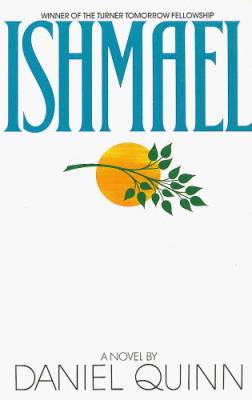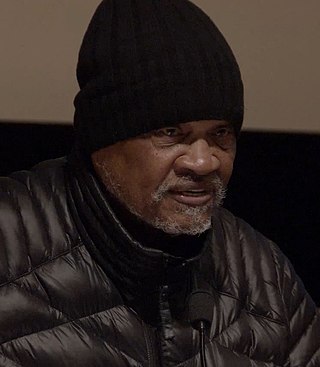
Abraham is the common Hebrew patriarch of the Abrahamic religions, including Judaism, Christianity, and Islam. In Judaism, he is the founding father of the special relationship between the Jews and God; in Christianity, he is the spiritual progenitor of all believers, whether Jewish or non-Jewish; and in Islam, he is a link in the chain of Islamic prophets that begins with Adam and culminates in Muhammad.

Moby-Dick; or, The Whale is an 1851 novel by American writer Herman Melville. The book is the sailor Ishmael's narrative of the maniacal quest of Ahab, captain of the whaling ship Pequod, for vengeance against Moby Dick, the giant white sperm whale that bit off his leg on the ship's previous voyage. A contribution to the literature of the American Renaissance, Moby-Dick was published to mixed reviews, was a commercial failure, and was out of print at the time of the author's death in 1891. Its reputation as a Great American Novel was established only in the 20th century, after the 1919 centennial of its author's birth. William Faulkner said he wished he had written the book himself, and D. H. Lawrence called it "one of the strangest and most wonderful books in the world" and "the greatest book of the sea ever written". Its opening sentence, "Call me Ishmael", is among world literature's most famous.
The First Book of Nephi: His Reign and Ministry, usually referred to as First Nephi or 1 Nephi, is the first book of the Book of Mormon, the sacred text of churches within the Latter Day Saint Movement, and one of four books with the name Nephi. First Nephi tells the story of his family's escape from Jerusalem prior to the exile to Babylon, struggle to survive in the wilderness, build a ship and sail to the "promised land," commonly interpreted by Mormons as the Americas. The book is composed of two intermingled genres; one a historical narrative describing the events and conversations that occurred and the other a recounting of visions, sermons, poetry, and doctrinal discourses as shared by either Nephi or Lehi to members of the family.

Ishmael is a 1992 philosophical novel by Daniel Quinn. The novel examines the hidden cultural biases driving modern civilization and explores themes of ethics, sustainability, and global catastrophe. Largely framed as a Socratic conversation between two characters, Ishmael aims to expose that several widely accepted assumptions of modern society, such as human supremacy, are actually cultural myths that produce catastrophic consequences for humankind and the environment. The novel was awarded the $500,000 Turner Tomorrow Fellowship Award in 1991, a year before its formal publication.

Abraham was a prophet and messenger of God according to Islam, and an ancestor to the Ishmaelite Arabs and Israelites. Abraham plays a prominent role as an example of faith in Judaism, Christianity, and Islam. In Muslim belief, Abraham fulfilled all the commandments and trials wherein God nurtured him throughout his lifetime. As a result of his unwavering faith in God, Abraham was promised by God to be a leader to all the nations of the world. The Quran extols Abraham as a model, an exemplar, obedient and not an idolater. In this sense, Abraham has been described as representing "primordial man in universal surrender to the Divine Reality before its fragmentation into religions separated from each other by differences in form". Muslims believe that the Kaaba in Mecca was built by Abraham and his son Ishmael as the first house of worship on earth. The Islamic holy day 'Eid ul-Adha is celebrated in commemoration of Abraham's willingness to sacrifice his son on God's command, as well as the end of the Hajj pilgrimage to the Kaaba.

Ishmael was the first son of Abraham, according to the Abrahamic religions. His mother was Hagar, the handmaiden of Abraham's wife Sarah. He died at the age of 137. According to biblical tradition, he is the ancestor of the Arabs.

Ishmael is a character in Herman Melville's Moby-Dick (1851), which opens with the line "Call me Ishmael." He is the first-person narrator of much of the book. Because Ishmael plays a minor role in the plot, early critics of Moby-Dick assumed that Captain Ahab was the protagonist. Many either confused Ishmael with Melville or overlooked the role he played. Later critics distinguished Ishmael from Melville, and some saw his mystic and speculative consciousness as the novel's central force rather than Captain Ahab's monomaniacal force of will.

According to the Book of Genesis, Hagar was an Egyptian slave, a handmaiden of Sarah, whom Sarah gave to her own husband Abram as a wife to bear him a child. Abraham's firstborn son, through Hagar, Ishmael, became the progenitor of the Ishmaelites, generally taken to be the Arabs. Various commentators have connected her to the Hagrites, perhaps claiming her as their eponymous ancestor. Hagar is alluded to, although not named, in the Quran, and Islam considers her Abraham's second wife.

Ishmael Scott Reed is an American poet, novelist, essayist, songwriter, composer, playwright, editor and publisher known for his satirical works challenging American political culture. Perhaps his best-known work is Mumbo Jumbo (1972), a sprawling and unorthodox novel set in 1920s New York.
Yaqub ibn Ishaq ibn Ibrahim, later given the name Israil, is recognized by Muslims as an Islamic prophet. He is held to have preached the same monotheism as his forefathers: Abraham, Ishmael, and Isaac.

Nephi is one of the central figures described in the Book of Mormon. In the Church of Jesus Christ of Latter-day Saints, he is described as the son of Lehi, a prophet, and the founder of the Nephite people. He is also the author of the first two books of the Book of Mormon, First and Second Nephi.

In the Book of Mormon, Laman and Lemuel are the two eldest sons of Lehi and the older brothers of Sam, Nephi, Jacob, and Joseph. According to the text, they lived around 600 BC. They were notable for their rebellion against Lehi and Nephi, becoming the primary antagonists of the First and Second Books of Nephi. Their descendants became known as the Lamanites and Lemuelites, while the descendants of Nephi and their other brothers became the Nephites. Disputes over the proper order of succession fueled disputes between the two peoples over the course of the Book of Mormon's narrative.

Book the Thirteenth: The End is the thirteenth and final novel in the children's novel series A Series of Unfortunate Events by Lemony Snicket. The book was released on Friday, October 13, 2006.

Ishmael Beah is a Sierra Leonean author and human rights activist who rose to fame with his acclaimed memoir, A Long Way Gone. His novel Radiance of Tomorrow was published in January 2014. His most recent novel Little Family was published in April 2020.
Michael Gerard Bauer is an Australian full-time children's and young adult author, and was formerly an English teacher.

Don't Call Me Ishmael is a young adult novel by Australian author Michael Gerard Bauer. It is about Ishmael Leseur, a 14-year-old boy, and his experiences in Year 9 of school. It won the 2008 award for children's literature at Writers' Week, Australia's oldest writers' festival. It was short-listed for the Children's Book Council of Australia's Book of the Year award in the older reader category in 2007. In April 2018, Don't Call Me Ishmael: The Musical by Fin Nicol-Taylor and Christopher Thomson, was premiered in Brisbane.

A Long Way Gone: Memoirs of a Boy Soldier is a 2007 memoir written by Ishmael Beah, an author from Sierra Leone. The book is a firsthand account of Beah's time as a child soldier during the Sierra Leone Civil War in the 1990s. The book describes the change from Beah being an innocent child to being corrupted by war and its effects. The book received positive reception and won several awards. However, some news outlets and historians have claimed parts of the novel do not correlate with historical events and could be inaccurate.
Ishmael is regarded as a prophet and the ancestor to the Ishmaelites in Islam. He is the son of Ibrahim, born to Hajar. Ismail is also associated with Mecca and the construction of the Kaaba. Ismail is considered the ancestor to Muhammad.

Stacy-Marie Ishmael is a journalist and editor from Trinidad and Tobago. She is currently the managing editor for crypto at Bloomberg News and the chair of the Foundation Board of the Craig Newmark Graduate School of Journalism.















